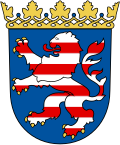From 1983 until 1987, Koch served as vice-chair of the federal youth organization of the CDU.
Minister-President of Hesse, 1999–2010
In the state elections in 1999, the CDU began collecting signatures to document the resistance in the population to plans of the federal government to make dual citizenship easier for foreigners to obtain. Because some people viewed this as "collecting signatures against foreigners", this campaign was portrayed as "xenophobic". [3] Koch won the election and displaced the incumbent, Hans Eichel. Under his leadership, the CDU achieved the best result for the party there in 60 years. [4]
In 2003, Koch and Peer Steinbrück, the Social Democrat premier of North Rhine Westphalia, together drew up a plan to reduce tax breaks and subsidies, including those on coal by 12 percent over several years. The subsidies were a particularly sensitive issue in North Rhine-Westphalia, where most of the coal mines are located. [5]
Ahead of the 2004 German presidential election, Koch publicly endorsed Wolfgang Schäuble as the Christian Democrats’s candidate to succeed incumbent President Johannes Rau. [6]
Under the leadership of party chairwoman Angela Merkel, Koch was elected vice-chairman of the CDU in November 2006, alongside Jürgen Rüttgers, Annette Schavan and Christian Wulff. [7] By 2007, he and Rüttgers, his counterpart from the state of North Rhine-Westphalia, agreed on approving a merger of their respective state-owned banks, WestLB and Landesbank Hessen-Thüringen (Helaba). [8] WestLB was eventually broken up in 2012 after years of losses and controversy.
Prior to the Hesse state election of 2008 Koch was once again accused of using xenophobic tactics by pledging to get tough on youth crime, which is concentrated among immigrant and minority groups. In the course of the election he lost his party's majority in the Hessian Parliament, but remained acting Minister President as his SPD challenger Andrea Ypsilanti was unable to form a government. Since none of the parties was able to build a majority coalition, they decided to give the voters another chance to produce a workable result.
In the January 2009 election the FDP made significant gains which allowed Koch to form a conservative-liberal coalition government, reelecting him as the Minister President of the State of Hesse. Ahead of the 2009 federal elections, he was tipped as a potential finance or economics minister in a coalition government of CDU/CSU and FDP. [9] [10]
In his capacity as Minister-President, Koch held various other positions, including the following:
- Fraport, Chairman of the Supervisory Board (1999–2003)
- ZDF, Member of the Board of Directors (2002–2011) [11]
- Hessische Kulturstiftung, Chairman of the Board of Trustees [12]
On 25 May 2010 Koch announced his withdrawal from the active politics. At the time, he said he had informed Merkel of his plan to leave politics more than a year before. [13] He resigned as Minister-President of Hesse on 31 August 2010. [14] He hinted that he was departing politics in order to become active in the business world. [15]
Political positions
Koch was seen as a rhetorically gifted politician; critics have accused him of populism. [16] A sometimes polarizing figure on his party's right, Koch proved to be one of the main defenders of business and financial interests within his party. [17] In 2010, Koch and Merkel clashed over budget cuts, as Koch proposed cutbacks in education and research that Merkel opposed. He also suggested that a law passed to provide a guaranteed child-care facilities for children under 3 would have to be reconsidered. [18] In his final years as Minister-President, he largely worked smoothly with Merkel. [19] Ahead of the Christian Democrats’ leadership election in 2018, Koch publicly endorsed Friedrich Merz to succeed Angela Merkel as the party's chair. [20]
On foreign policy, Koch forged a friendship with the Dalai Lama and supported the self-determination of Tibet. [21]


